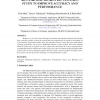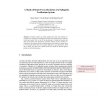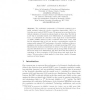121
click to vote
CORR
2010
Springer
14 years 10 months ago
2010
Springer
Biometrics is the science and technology of measuring and analyzing biological data of human body, extracting a feature set from the acquired data, and comparing this set against ...
148
click to vote
IEEEHPCS
2010
15 years 2 hour ago
2010
The performance (in term of error rate) of biometric systems can be improved by combining them. Multiple fusion techniques can be applied from classical logical operations to more...
128
click to vote
BIOSIG
2010
15 years 3 days ago
2010
: The privacy and data protection challenges posed by biometric systems have been discussed in detail in the last years. Both security opportunities and privacy risks however may d...
BIOSIG
2003
15 years 3 months ago
2003
: A new biometric system is proposed which replaces the template match known from presently used biometric systems by a more powerful approach that uses error tolerant coding. This...
147
click to vote
CSREASAM
2006
15 years 3 months ago
2006
Apart from making the authentication system reliable, biometric systems reduce the time required for authentication considerably at the airports, borders, and government offices. ...
122
click to vote
BIOSIG
2008
15 years 3 months ago
2008
: Biometrics provide the possibility of unique and convenient authentication. As its application areas grow rapidly, the problems, such as identity fraud and cross matching, threat...
ICB
2007
Springer
15 years 6 months ago
2007
Springer
Performance of biometric systems is dependent on quality of acquired biometric samples. Poor sample quality is a main reason for matching errors in biometric systems and may be the...
115
click to vote
ECCV
2004
Springer
15 years 7 months ago
2004
Springer
The problem of biometric sensor interoperability has received limited attention in the literature. Most biometric systems operate under the assumption that the data (viz., images) ...
137
click to vote
AVBPA
2005
Springer
15 years 7 months ago
2005
Springer
Abstract. Biometric systems are widely applied since they offer inherent advantages over traditional knowledge-based and token-based personal authentication approaches. This has le...
140
click to vote
AVBPA
2005
Springer
15 years 7 months ago
2005
Springer
Abstract. The verification performance of biometric systems is normally evaluated using the receiver operating characteristic (ROC) or detection error trade-off (DET) curve. We p...



